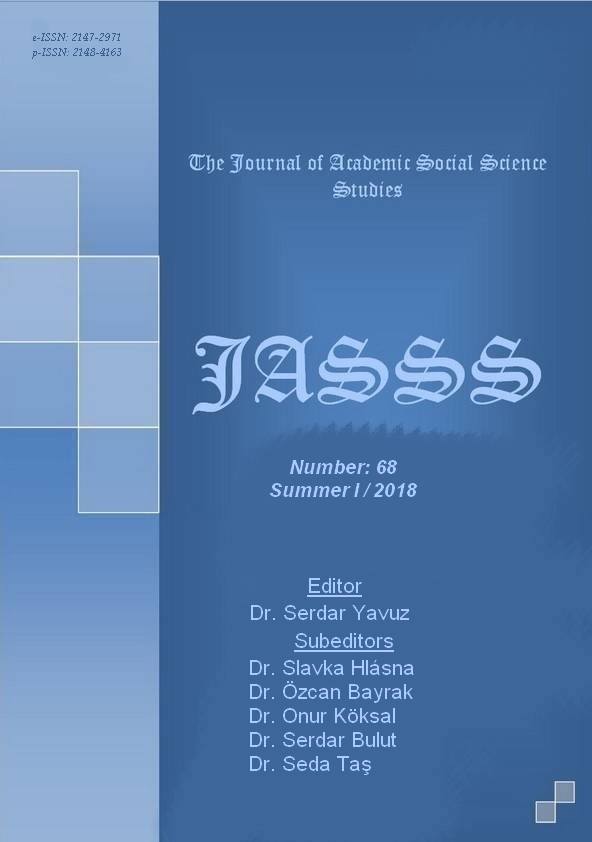AKTİF YAŞLANMA POLİTİKASI: HUZUREVİNDE KALAN VE EVDE BAKIM AYLIĞI İLE AİLESİ YANINDA DESTEKLENEN YAŞLI BİREYLERİN AKTİF YAŞLANMA ALGISI
Author :
Abstract
Bu araştırmanın amacı aktif yaşlanma politikası açısından kurumsal bakım ve evde bakım süreçlerini sosyal destek bağlamında karşılaştırmak ve sosyal politikalar bağlamında çıkarımlar yapmaktır. Toplumların yaşlanma sürecine girmesiyle birlikte, gelişmiş ülkelere paralel olarak ülkemizde de yaşlılık politikaları ve yaşlılara yönelik hizmetlerin önemi artmaktadır. Son yıllarda uzun soluklu ve toplumun tümünü hedef alan aktif yaşlanma politikaları etkin yaşlanma politikası olarak uygulanmaktadır. 2012 yılının “Aktif Yaşlanma Yılı” olarak ilan edilmesinden itibaren konuyla ilgili olarak yaşlanma ulusal eylem planlarında ve çeşitli bilimsel toplantılarda stratejiler belirlenmekte proje ve etkinliklerle süreç desteklenmektedir. Aktif yaşlanma DSÖ’nün belirlediği sağlık, güvenlik ve katılım ilkeleri temelinde yaşlıların yaşam kalitelerini attırma amacı taşıyan bir süreçtir. Aktif yaşlanmada öne çıkan hususlar koruyucu sağlık uygulamaları, yaşam boyu eğitim, yaşlıların iş yaşamında tutulması, sosyal güvencelerinin sağlanması, toplum içerisinde yaşlanma, sosyal destek ağlarının varlığı, kuşaklararası dayanışma, yaşlı bireylere yönelik önyargı ve ayrımcılığın önlenmesi gibi hususlardır. Yaşlılık süreci içinde belirli seviyelerde bakım ve günlük ihtiyaçlar oluşmaktadır. Bakım süreci söz konusu olduğunda kurumsal bakım ve evde bakım seçenekleri kullanılacaktır. Aktif yaşlanma politikası yaşlı bireylerin toplum içerisinde kendi yaşam ortamlarında ve sosyal destek ağları içerisinde yaşlanmasını öngörmektedir. Bu çalışmada evde bakım aylığı desteği ile ailesi yanında bakım alan yaşlı bireylerle huzurevinde yaşamlarını sürdüren bireylerin aktif yaşlanma algıları değerlendirilmiş ve evde bakım alan kişilerin bağımsız algılama, sağlıklı algılama, ekonomik güven, kuşaklararası dayanışma ve saygı/itibar algıları ve bunlardan elde ettiği toplam aktif yaşlanma algıları anlamlı olarak daha yüksek bulunmuştur. Ayrıca aktif yaşlanma algısı ve özellikle bağımsız ve sağlıklı algılama kadınlarda erkeklere göre daha yüksek bulunmuş, yaş ilerledikçe aktif yaşlanma algısının düştüğü belirlenmiştir. Bakım hizmet türü dışında yaşlı bireylerin aileleri ile ilişkilerinin kalitesi de tüm boyutlarıyla aktif yaşlanmayı etkilemektedir. Yaşlılık döneminde bakım söz konusu olduğunda bu kişiler için en önemli unsur yakın sosyal destek ağlarının bulunmasıdır. Bu nedenle aktif yaşlanma süreci için yaşlı bireylerin eğer yalnız değillerse evde bakım aylığı gibi destek ve teşviklerle ailesi yanında yaşlanması doğru bir uygulama olacaktır
Keywords
Abstract
The aim of this research is to compare the institutional care and home care processes in terms of social support with regard to active aging policy and to make inferences in the context of social policies. Along with the aging of the societies, the importance of policies and services for elderly is increasing in our country in parallel with the developed countries. Active aging policies targeting the long-term and the whole society are being implemented as effective aging policy in recent years. Since the announcement of 2012 as the "Active Aging Year", strategies are being determined in national action plans and various scientific meetings related to the subject, and the process is supported with various projects and activities. Active aging is a process that aims to raise the quality of life for the elderly on the basis of health, safety and participation principles set by WHO. Preventive health practices, lifelong education, retention of the elderly in the workplace, providing social security, aging in the community, the existence of social support networks, intergenerational solidarity, prevention of prejudice and discrimination against elderly individuals are the prominent aspects of active aging. Certain levels of the needs of care and daily activities arise in the aging process. İnstitutional care and home care options will be used when it comes to the care process. The active aging policy provide for aging individuals to age within their own living environments and social support networks within society. In this context, active aging perceptions of the elderly lived in nursing homes and elderly individuals who took care of their family supported by home care aid were evaluated and the, independence perception, healthy perception, economic trust, intergenerational solidarity, respect / esteem perceptions and the total active aging perceptions were found to be significantly higher in the home care recipients in this study. In addition, active aging perception and especially independent and healthy perception were found higher in females than males and it was determined that active aging perception decreased with age. Apart from the type of care service, the quality of relationships with families of elderly also affects active aging in all dimensions. When care is provided in the old age period, the most important element for these people is the availability of close social support networks. Therefore, it would be a good practice for elderly people to stay with their family with support and incentives such as home care aid if they are not alone for active aging process.





